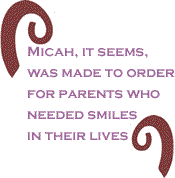June
was always a big month in my family. My fatherís birthday,
my birthday, Fatherís Day, and my parentsí anniversary all
jammed into a period of a few weeks.
Last
yearís Fatherís Day was a bittersweet one for me, and I
imagine that from now on, Fatherís Day for me will always
evoke a bit of happiness mixed with pangs of grief. Last
year at around this time, I was mourning the loss of my
son Ezra, who had died only months earlier. Ezraís umbilical
cord had ruptured from the placenta a few weeks before his
due date, cutting off his oxygen in utero and choking him.
My wife had to go into labor to give birth to our son who
had already died. I held him, and laughed and cried at the
same time. I laughed because I was happy to see my sonís
adorable, silly face for the first time, and I cried because
I would never hold him again, never get to see him grow
up and reach all of lifeís milestones. And we buried him
several days later, but not before reading him a bedtime
story. And I never thought Iíd have to bury my own child,
ever. As I literally buried him in the ground with a shovel,
at the cemetery, I felt as if I was burying part of myself
as well.

For
those who have lost a child, you know what I mean. For those
who havenít, I hope you never know such pain and emptiness.
There is no loss greater than the loss of your child. It
is the hopeless nightmare that does not subside. Eventually,
you learn to live with your loss and incorporate the memory
of your child into daily life. You must do so if you are
to regain any sense of a normal existence, whatever normal
means. You learn to live as a new person with a new sense
of normal. But the pain never goes away entirely, nor should
it.
So
on that Fatherís Day weekend of 2009, I was a father deprived
of my son in physical form, though he remained buried in
my heart. And at the same time, there was joy. My father
was recovering from major surgery, and I had made countless
trips back and forth from Philadelphia
to New York City to visit him in the hospital. Though he was frail, immobile
and only a hint of his formerly robust, colorful, loquacious
and trash-talking self, he was still Dad. I said goodbye
to him that day, wishing him a happy Fatherís Day and all
that. He gave me a mile-long stare unlike any he had given
me before. He had a peaceful look on his face, as if somehow
he was alright, no matter what.
The
next week my father died.
We
were so different, yet so much alike, my father and I. He
was a veteran and a union guy, while I have dual Ivy League
degrees. While his tour of duty in the Army took him to
Japan
and Korea, years later I lived in Japan as an exchange student, studied Japanese
in college, and worked in Tokyo
for an ad agency and a bank. Both of us were blessed with
a strong sense of community service.  My
father was active in his church and his V.F.W. post, while
I became an activist, writer and advocate armed with a law
degree. Both of us experienced racial discrimination, which
is par for the course for black men in America.
Iíve had experiences and opportunities my father couldnít
have imagined, and yet he was partly responsible for them
happening, and for my access to them. My
father was active in his church and his V.F.W. post, while
I became an activist, writer and advocate armed with a law
degree. Both of us experienced racial discrimination, which
is par for the course for black men in America.
Iíve had experiences and opportunities my father couldnít
have imagined, and yet he was partly responsible for them
happening, and for my access to them.
This
year, I observe my first Fatherís Day without my father,
who lived a full life, and a second Fatherís Day without
my son, who never had a chance to live life. And Dad is
now looking after his grandson in that far away spirit world,
which gives me some comfort. In that year since my father
left us, my son Micah was born. And what a joy he is! He
seems to smile all the time, more than his father or grandfather
ever could. Micah, it seems, was made to order for parents
who needed smiles in their lives, and once believed theyíd
never laugh again. But why couldnít I have both of my sons
with me on Fatherís Day?
Often
I think about the fathers who lost their children, and the
children who lost their fathers, whether through disease,
famine, war or terrorism - or handgun violence in the streets
of America, or corporate malfeasance - you know, crimes
committed on offshore oil rigs or in coal mines. Fathers
are separated from their children by prison bars miles away
upstate, in this land of the incarcerated, or senseless
permanent wars half a world away in Eurasia
or Eastasia or another designated enemy.
Men
who cannot be with their children, and people who are separated
from their fathers might not be in the mood to celebrate
Fatherís Day, and that is ok. What is important is that
we learn to honor and remember those we love when they are
not or cannot be with us now or ever. And you donít need
a special day for that.

BlackCommentator.com Executive Editor, David
A. Love, JD is a journalist and human rights advocate based
in Philadelphia, and a contributor to The Huffington
Post, theGrio, The Progressive
Media Project, McClatchy-Tribune News Service,
In These
Times and Philadelphia
Independent Media Center. He also blogs at davidalove.com, NewsOne, Daily Kos, and Open Salon. Click here to contact Mr. Love. |

